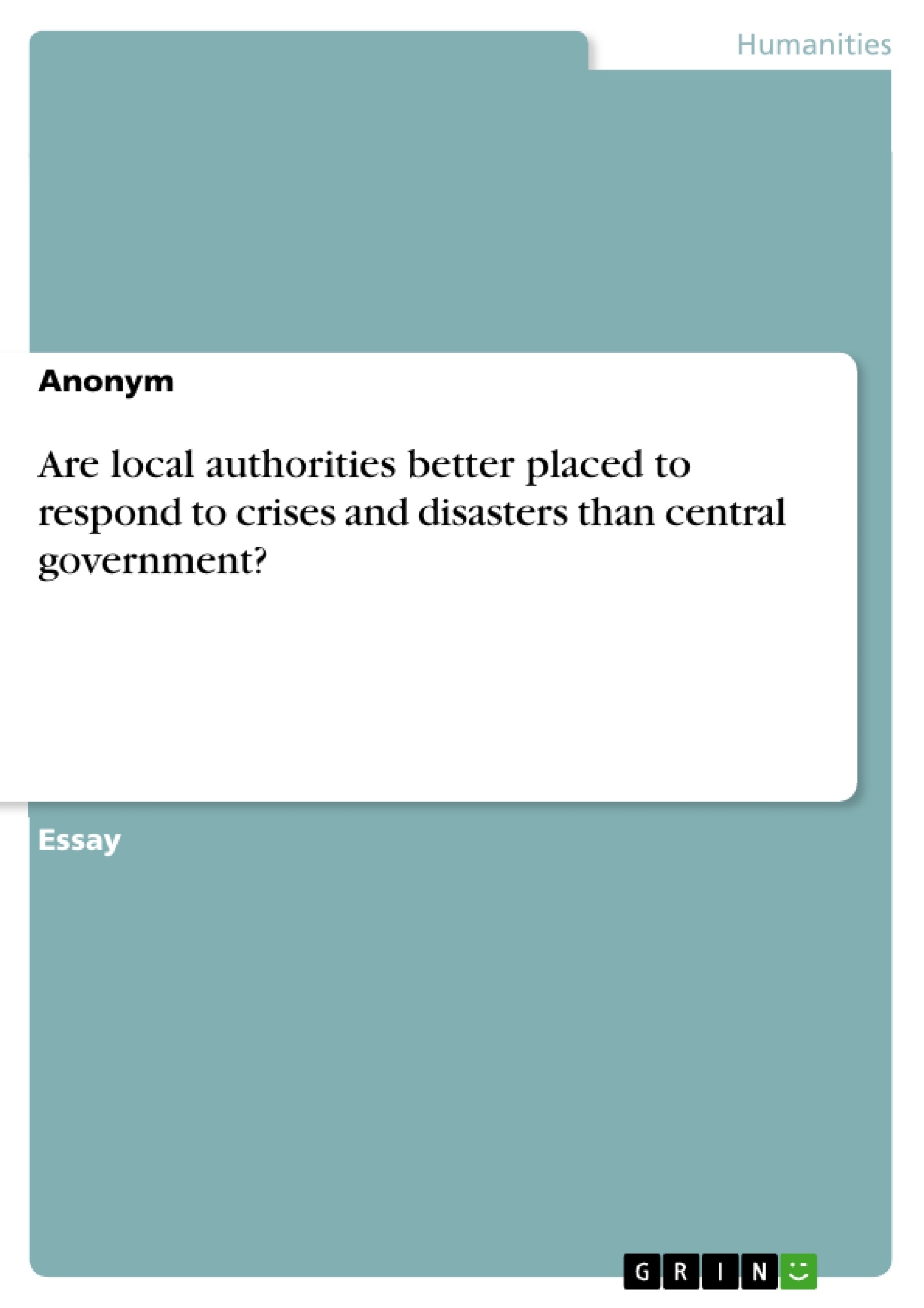When crisis looms or disaster strikes, adverse effects that affect a community or a nation are likely to emerge. To reverse these adverse effects to health, safety and property and restore the community back to routine functioning a swift and unencumbered response is required. Few would doubt that especially in times of crisis and disaster, central government is responsible for protection of life and property, and has a duty to provide for the protection of its citizens. However, O’Leary (2004: 1) points out the importance of local authorities in this process stating that virtually all disasters are experienced at the local level, where many communities and emergency response services can expect to be on their own for the first seventy-two hours after impact.
Inhaltsverzeichnis (Table of Contents)
- Introduction
- Definitions
- Crisis
- Disaster
- Central government
- Local authority
- Decentralization
- Crisis and Disaster Preparation
- Crisis and Disaster Response
- Conceptual Framework
- Emergency Preparation Structures in the UK
- Emergency Response Structures in the UK
- Integrated Emergency Management (IEM)
- Case study
- Emergency Response in London - Strengths
- Emergency Response in London - Weaknesses
- Conclusion
Zielsetzung und Themenschwerpunkte (Objectives and Key Themes)
This essay aims to investigate the proposition that local authorities are better equipped to respond to crises and disasters than central government. It examines this statement by drawing upon contemporary approaches to crisis and disaster management, analyzing the roles of both central and local governments in the UK, and evaluating the effectiveness of responses to the London bombings of 7 July 2005.
- The role of central government and local authorities in crisis and disaster management.
- The advantages and disadvantages of decentralized approaches to crisis and disaster response.
- The importance of integrated emergency management (IEM) in coordinating responses.
- The effectiveness of local authorities in responding to crises and disasters, particularly in the context of the London bombings.
- The need for a nuanced approach that balances the strengths of both central and local governments in managing emergencies.
Zusammenfassung der Kapitel (Chapter Summaries)
- Introduction: This section introduces the essay's proposition and sets out the argument that local authorities are better placed to respond to crises and disasters, but within a nationally integrated framework. The essay also outlines its structure and the case study of the London bombings that will be used to support the argument.
- Definitions: This section defines key terms such as crisis, disaster, central government, local authority, decentralization, and crisis and disaster preparation and response. It explores the various definitions used by different organizations and highlights the specific context of these terms within the UK.
- Conceptual Framework: This section delves into the theories surrounding centralized vs. decentralized disaster preparation and response, building a framework for understanding the nuances of effective crisis and disaster management. This section sets the stage for examining the UK's emergency preparedness and response structures.
- Emergency Preparation Structures in the UK: This section introduces the emergency preparedness structures in the UK, outlining the key organizations and their roles in disaster management. It examines the underlying principles of these structures, demonstrating the importance of a coordinated approach.
- Emergency Response Structures in the UK: This section examines the emergency response structures in the UK, focusing on the implementation of disaster response plans. It discusses the concept of Integrated Emergency Management (IEM) as a crucial element in ensuring effective coordination and collaboration.
Schlüsselwörter (Keywords)
Key concepts explored in this essay include crisis management, disaster management, central government, local authority, decentralization, integrated emergency management (IEM), and the London bombings of 7 July 2005. The essay focuses on analyzing the strengths and weaknesses of local and central government responses to major emergencies, ultimately arguing for a nuanced approach that combines the strengths of both levels of government.
- Quote paper
- Anonym (Author), 2013, Are local authorities better placed to respond to crises and disasters than central government?, Munich, GRIN Verlag, https://www.hausarbeiten.de/document/293253


